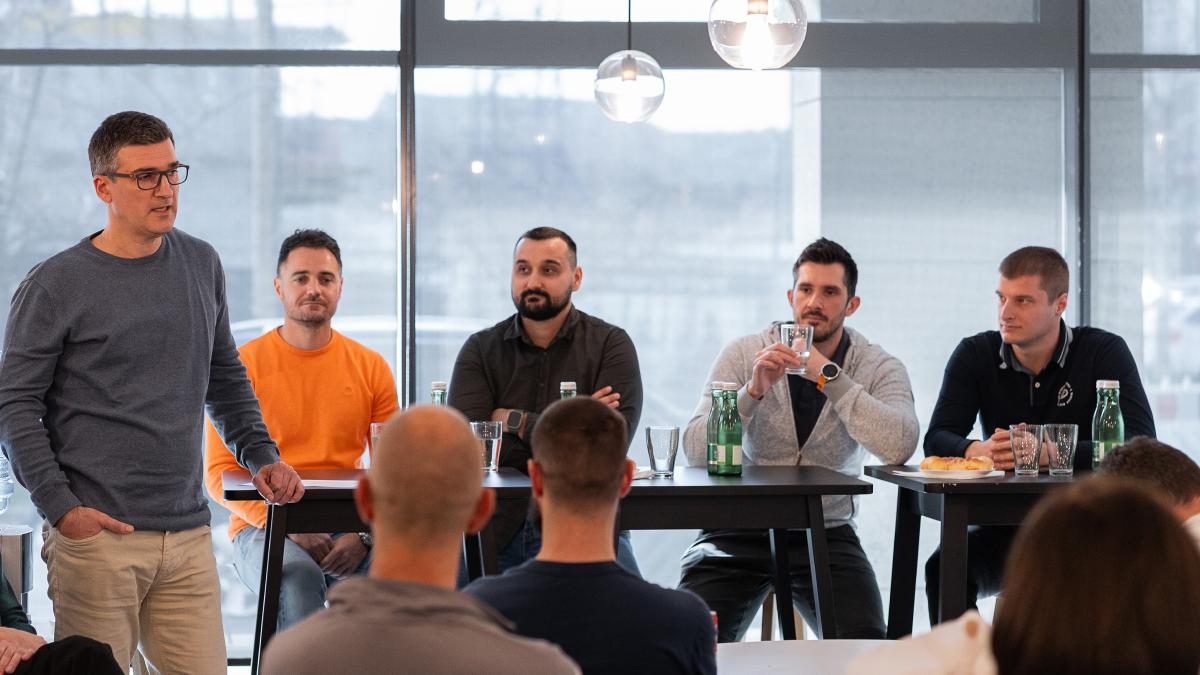Promotions work on two levels – they signify the recognition of the growth of a team member but, in a broader sense, they also signal the values the organization chooses to promote and celebrate.
By announcing the promotions of 150 of our team members in May, HTEC has sent an unambiguous message that the growth of the company is intrinsically the growth of our people – it creates opportunities for everyone to show creativity, assume responsibility, to be daring and adventurous in embracing change and shaping its course.
At only 27, Aleksandar Kahriman has seen and welcomed more change than most engineers face over the course of a career. His seven-year journey in the industry has taken him from intern to people manager and, in recent years, Solution Architect.
Aleksandar was kind enough to give us a sightseeing tour of his mind, with dedicated stops at the stations of the driving principles and formative milestones of his career. All aboard!
Read the other articles in the series:
Into the code
Like many of our team members, Aleksandar had shown an early gift for mathematics and physics. In elementary school, his academic pursuit landed him on a specialized curriculum for students gifted in mathematics, physics, and computer science within the “Jovan Jovanović Zmaj” grammar school in Novi Sad. There he had his first encounter with the world of programming.
“If you can believe it, my first programming language was Pascal, so I got to experience that old fashioned blue screen with the white cursor, which you can only move with your keyboard, so that was fun. Then, throughout high school, we started picking up more complex computer science topics. We went through quite a lot, starting from Delphi, C, C++, assembler, even some work with databases, and we were building quite interesting things, mostly focused on algorithms and data structures. So, my interest in computer science kind of developed there and it just kept accelerating over time.”
What were your first steps in the industry?
I actually started working quite early. I had just finished my first year of studies when I got a scholarship opportunity in a software engineering company. The company was Execom, and I am not sure if I was even 20 when I first walked through the door. That’s when the real learning started.
As part of the scholarship, I was involved there for 20 hours a week. I was lucky to be assigned to a large team on a project related to maritime transport and communication, which, in hindsight, was a great entry point into a professional career. I really felt accepted there, I had great mentorship, and I even tagged along with the team on a ski trip about one month into my scholarship where I got to know everyone a bit better. And after about 8 or 9 months, I started working full time there and I was assigned to my first actual project. This was an important milestone for me, because it wasn’t a scholarship anymore. I was no longer just learning and being a kind of an investment for the company, but I was able to give something back.
Was it intimidating to enter the industry at such a young age?
To be honest, the overwhelming emotion was enthusiasm. I was working and studying at the same time, and I had many days where I would be at the university at 7 AM, then go to Execom at around 10-11, spend a few hours there and then go back to classes until the evening. The great part about it is that I never felt tired – it was an amazing source of energy at that point.

Embracing opportunity
From that point, you quickly found yourself in a Lead role. What was your motivation for your early growth?
If you asked me then, I would probably have said that I was driven by enthusiasm and the ambition to grow, but over the years I have found that I am a bit of a learning junkie.This has always lead me to zoom out more and more, to gauge the bigger picture. I always wanted to understand all the sides. That isn’t always realistic, of course, but I always tried to go beyond what the job description is. I guess that’s what ultimately gave me the opportunity to lead on quite a few projects. I eventually became a Tech Lead, and in that role I was responsible for Execom’s entire Mobile team.
How did this responsibility impact your perspective?
The specific thing about mobile roles, generally speaking, is that they are typically not in high demand on projects. If we take an average project, we would maybe have one mobile developer for each platform. So, I wasn’t leading a team working on one project, which is usually the case. Instead, my team members were assigned to different projects, which meant that I was all over the place. I got to experience many challenges on many different projects, and navigating through that is the best growth mechanism. It is a catalyst. Working on a single project would have perhaps given me more depth, but working on 3-5 projects at any time has given me breadth. This experience was valuable to me because in the sense that it has led me to my present role. As a Solution Architect, it is my job to look at systems holistically, both from a technical and business perspective.
What was the support system you encountered, both in Execom and as your career continued to evolve in HTEC?
In my experience, if you show initiative for something, if you invest and keep doubling down on that, you will always find help. My initial boost was getting to partner up with great mentors and great team leaders, just getting to see how they thought and picking up pieces of wisdom that go a long way. Then, when I was ready to make the next step, I had full support. It’s like a wave that keeps growing, and so far, I have managed to stay on (laughs).

Career choices
At HTEC, your career took another turn, as you went from a managerial role to a strictly technical one. How did this shift come about?
When Execom joined HTEC, I encountered an incredible opportunity. We were in the initial stages of a new project, and the team that was forming was going to be the biggest single project team HTEC has ever assembled. I started out in a sort of an incognito Tech Lead role, helping out the Solution Architects dedicated to the project, one of which is now my mentor (HTEC’s Global Head of Technology Nikola Živanović). This experience has helped clarify where I wanted to go next with my career, as I realized that what they were doing was a natural fit for my scope of interests.
From there, I entered an intense period of mentorship and a lot of exposure to all aspects of the role. Because the role involves interacting with clients, team members, and management, the words and deeds of a Solution Architect carry a lot of weight and have consequences. I think it was amazing how they gave me just enough exposure to make great progress while still keeping things kind of safe, both for me and the company.
Was it difficult to let go of managerial responsibilities?
It wasn’t easy to start. I loved working with the people on the team. I believe that we have done good work and set high standards, and I am proud that many of them have found continued success and grown beyond their age. I also enjoyed being a part of building a great system, which is its own art and science all in one. However, for some time I have felt like these added responsibilities were preventing me from fully pursuing my passion for technology and building myself in that area.
Having seen the evolution of HTEC in your two years with the company, and also evolving with it yourself, what do you feel are some of its distinguishing qualities?
Things that I love about HTEC are the drive of the people, the speed with which everything happens, and the amount of opportunities here that realistically can’t be attained at many other companies. HTEC is constantly growing and creating new opportunities for its employees. It is a simple win-win situation where there is a need for sophisticated solutions across the board, HTEC has the capacity to tackle even the most demanding challenges, and team members get a chance to do interesting work. I like doing interesting things, so it’s a great fit.
I would strongly suggest jumping aboard to anyone who’s interested in the wider scope of technology and business. This might sound cheesy, but it really is a gift that keeps giving – the more you connect the dots across different technology, business and product spheres, the more amazing things you get to understand and learn. Being able to understand why some things are as they are, it’s simply great.
If you wish to explore the diversity of career paths at HTEC, make the first step at careers@htecgroup.com.






